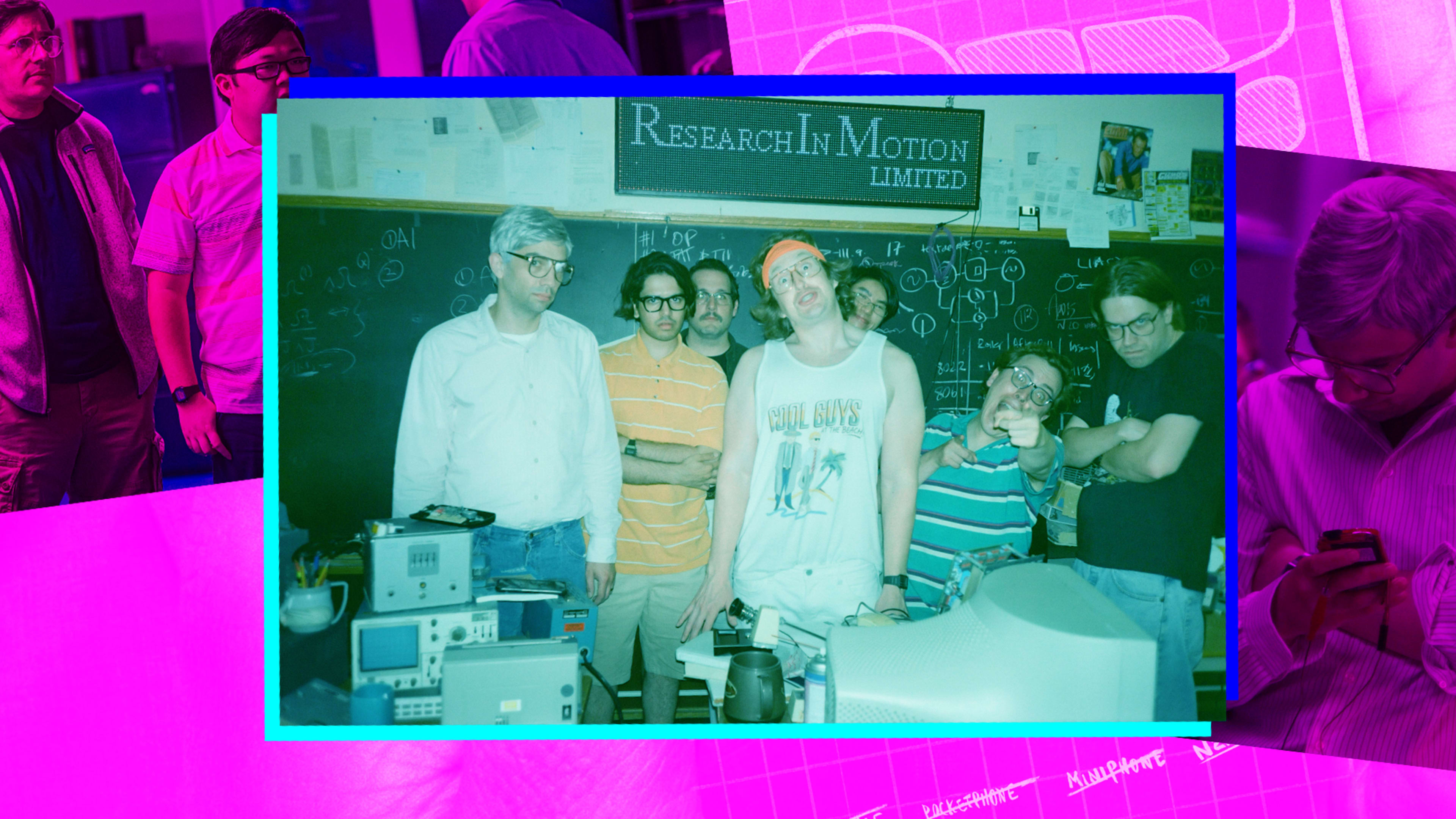At its height, BlackBerry controlled 45% of the cellphone market.
Today, it’s 0%.
The new movie BlackBerry ends with that on-screen coda, which I hope does not come as a spoiler. If you’ve been paying even scant attention to the tech industry in this century, it shouldn’t. After all, the once-iconic Canadian smartphone’s decline and fall in the iPhone age is as classic a case study of business failure as they get.
Written by Matt Johnson and Matthew Miller and directed by Johnson, the film is based on Jacquie McNish and Sean Silcoff’s fine 2015 book Losing the Signal: The Untold Story Behind the Extraordinary Rise and Spectacular Fall of BlackBerry. Their reporting originated in a 2013 article in Canada’s Globe and Mail, which I loved and said would make a good book at the time. But I’m not thrilled with the motion picture incarnation. As a technology journalist, I cheerfully admit I am inclined to judge it by what it tells us about events that actually happened involving real human beings in the not-too-distant past. On that front, it comes up short.
To be fair, BlackBerry calibrates our expectations with an opening disclaimer that it’s a “fictionalization” of the story of Research in Motion, the company that gave us the once-iconic smartphone. Its versions of co-CEOs Mike Lazaridis (played by Jay Baruchel) and Jim Balsillie (It’s Always Sunny in Philadelphia’s Glenn Howerton) are cartoonish stereotypes— respectively, a Rick Moranis-style nerd and a screaming asshole businessman. The movie is not too concerned with hewing to the gnarly details of tech history: For instance, it fast-forwards over the years RIM spent quietly making smart pagers before it ever released a phone and has modem maker USRobotics, who’d bought RIM rival Palm, as a public company long after it had itself been acquired by 3Com.
Nobody should mistake BlackBerry for a documentary. But it would be nice if the movie spurs people to take a new look at the RIM story—and maybe even reassess it.
Yes, it’s easy to see why the company remains so associated with corporate disaster. For a period that seemed interminable, Lazaridis and Balsillie luxuriated in self-defeating hubris rare even by the standards of endangered tech CEOs. RIM’s first big attempt to compete with the iPhone, 2008’s awful BlackBerry Storm, deserved to fail big-time—and did. The BlackBerry PlayBook, its response to the iPad, may have been even worse. (That one goes unmentioned in BlackBerry, whose running time of one hour, 59 minutes has time for only so many fiascos—if they make a sequel, it should definitely include Alicia Keys being named as the company’s creative director and then being caught tweeting from an iPhone.)
But you know what? In the wake of the iPhone, RIM would likely have been toast even if its co-CEOs had made all the right moves. Consider what happened to Palm, Microsoft, and Nokia, the other major smartphone platform providers from the pre-iPhone days. Their efforts were all eviscerated just as decisively as RIM, and for similar reasons.
While many factors were at play, one seems insurmountable to me. The iPhone ran a version of Apple’s desktop operating system, OS X, a vastly more powerful piece of mobile software than anything before it. Trying to gussy up something based on an earlier platform to compete with it was like sticking wings on a locomotive and hoping it would fly. (In April 2010, RIM did acquire an operating system that was modern and robust enough to stand a chance at competing with the iPhone, but it was just too late.)
As we know now, only one smartphone platform player figured out how to take on the iPhone. That would be Google, which had the vision to acquire an ambitious mobile software startup called Android in 2005, giving it a foundation for a next-generation smartphone platform that could survive the iPhone’s epoch-shifting impact. But while Google certainly did more things right than RIM, Microsoft, or Nokia, it also benefited from not having an existing phone business to worry about.
The least dramatically compelling parts of BlackBerry are those that make a good-faith effort to explain why the device was a hit in the first place. Its surprisingly usable tiny QWERTY keyboard was a genuinely game-changing form of input, back when triaging email was mobile computing’s killer app. By securely pushing data to its handhelds without overwhelming the era’s poky wireless networks, RIM really did gain a formidable competitive advantage. The popularity of its BlackBerry Messenger service even hinted at the smartphone’s potential to become a covetable mass-market consumer device, well before most people had ever touched one.
In BlackBerry, Lazaridis and Balsillie are depicted as a bumbler and a jerk leading a team of dudes who seem to spend most of their office hours playing video games and watching movies. (I’m not exaggerating: They’re barely shown doing anything else.) Yet as the film briefly acknowledges, major tech companies spent much of the 1990s building smart wireless devices that weren’t good enough to matter. By contrast, RIM figured out how to make one that worked so well it became an essential part of millions of lives. It wasn’t a happy accident, but rather a breakthrough product that arrived at precisely the right time.
That may not be the stuff of riveting entertainment. But it’s as much a part of the BlackBerry legacy as what came later—and I, for one, choose to remain impressed.
This story is from Fast Company’s new Plugged In newsletter, a weekly roundup of tech insights, news, and trends from global technology editor Harry McCracken, delivered to your inbox every Wednesday morning. Sign up for it here.
Recognize your brand’s excellence by applying to this year’s Brands That Matter Awards before the early-rate deadline, May 3.
